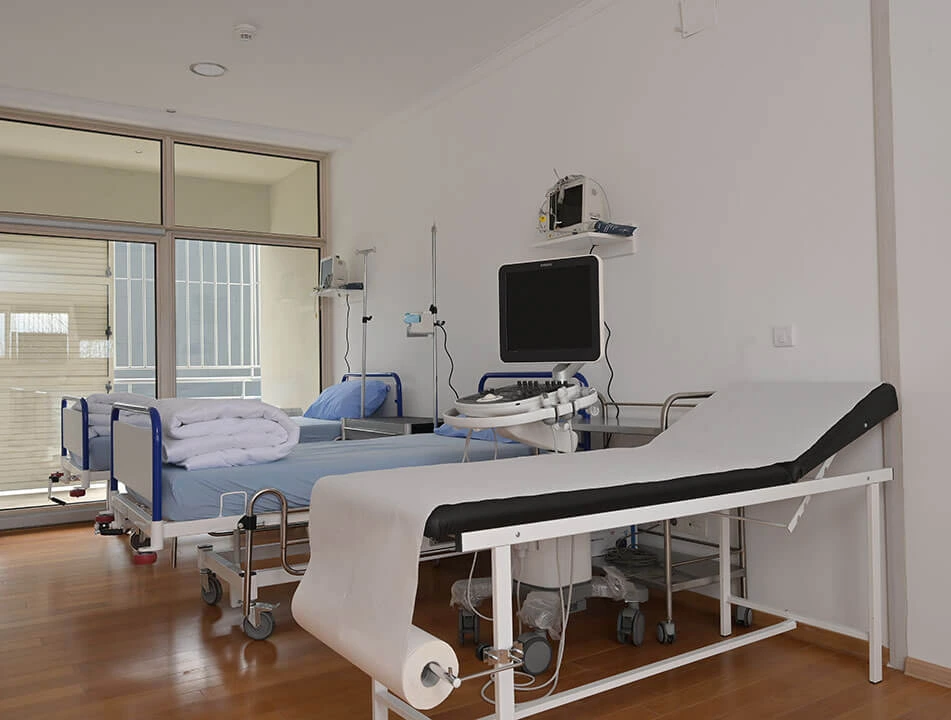The examination takes place through a conversation with a psychiatrist, where a personal and family history of the disorder is taken. The aim of the conversation is to try to get to know the patient better through answers, to see the difficulties, circumstances that led to the disorder and other relevant facts that are important for diagnosing the disorder, assessing the patient’s condition and applying appropriate pharmacotherapy. During the treatment the psychiatrist conducts daily interviews with the patient in order to monitor the condition and effectiveness of procedures, psychotherapy and pharmacotherapy.
Immediately after the patient’s admission to hospital, blood tests are performed – CBC, biochemical analyzes, analyzes for HIV and hepatitis viruses, as well as extended analyzes if indicated. In addition to laboratory blood tests, urine tests are also performed.
Each patient will be examined upon the admission by an internal medicine specialist in order to determine indications, but also contraindications for the procedures that the hospital has at its disposal, related to the anxiety treatment program.
Immediately upon the admission, and based on the internal examination, an internal medicine specialist determines additional diagnostic procedures with which we will determine the indications and contraindications for treatment, including abdominal and cardiac ultrasound, ECG, Doppler blood vessels. If necessary, additional procedures are performed (MRI, CT, X-ray, gastroscopy, etc.) that do not belong to the standard program, and are performed if recommended by a doctor in agreement with the family.
Psychological testing that involves the use of tests to assess cognitive functions, personality assessment through structured psychological tests and projective techniques. In working with a psychologist and a special pedagogue, we assess the psychological status of the patient based on which we determine the psychotherapeutic approach to treatment individual for each patient.
Treatment involves a combination of pharmacotherapy and psychotherapy. The basic drugs for treatment are antidepressants, predominantly those belonging to the group of selective inhibitors of serotonin reuptake. Sedatives are included only at the beginning and are quickly eliminated from therapy. This is because they have a very great potential for the development of addiction if taken for a long time and without control.
For the treatment for anxiety disorders, cognitive behavioral therapy is the method of choice in relation to all other types of psychotherapy. We teach the patient self-help techniques, breathing exercises and do guided meditation, we find ways to control fears without medication. Psychotherapeutic work with psychologists and special pedagogues, as well as psychotherapists from different psychotherapeutic directions, is aimed at changing opinions and attitudes in relation to the disorder.
Based on those opinions and attitudes changes in behavior are also made through work, which is of crucial importance in the rehabilitation period in order to maintain a stable mental state.
Through psychotherapeutic work, a different view of life after treatment is also developed, as well as a view of the past from a different perspective.
As part of the anxiety treatment, the patient goes through a procedure with a psychologist and a special pedagogue through psychological procedures aimed at strengthening voluntary mechanisms. Procedures include psychotherapeutic work assisted with pharmacotherapy. These are procedures for creating a conditioned reflex of alcohol aversion – aversive procedures, a combination of psychotherapy sessions with intravenous infusion of transmediators, which allows increasing the potential of psychotherapy to the maximum level and psychotherapy with which a psychologist or special pedagogue acts suggestively on the patient’s subconsciousness assisted with medications.
During the treatment, a psychologist and a special pedagogue, based on previously made assessments, do education about the disorder with patients and families of patients.
Education includes looking at disorder from a medical point of view, recognizing the triggers that introduced and keeping the patient addicted to the disorder, as well as looking at the direct consequences.
The key part of the education is related to the rehabilitation part that begins after hospital treatment, the so-called outpatient part that lasts for the next year.

